

New Zealand approves paid leave after miscarriage. Employees in the country will be entitled to three days' leave after a miscarriage under the law, which is set to gain royal assent after passing its final stage in parliament.
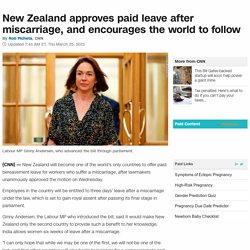
Ginny Andersen, the Labour MP who introduced the bill, said it would make New Zealand only the second country to provide such a benefit to her knowledge. India allows women six weeks of leave after a miscarriage. "I can only hope that while we may be one of the first, we will not be one of the last, and that other countries will also begin to legislate for a compassionate and fair leave system that recognizes the pain and the grief that comes from miscarriage and stillbirth," she said in parliament during the final reading of the bill.
England's first not-for-profit IVF clinic to open in 2021. England’s first not-for-profit IVF clinic is to open in London next year, run by a charity better known for providing abortions.
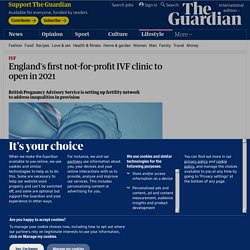
The British Pregnancy Advisory Service, which has been helping women terminate pregnancies for more than 50 years, has decided to set up its own fertility network to address the inequalities in IVF provision in England. It plans to undercut private clinics and charge only the true cost of treatment, which it estimates will be between £3,000 and £3,500 each IVF cycle, not including drugs. There will be no expensive “add-ons” – such as embryo glue or “assisted hatching” – which patients often feel pressured into accepting at a very vulnerable time, despite many not being proved to work. Women should be offered three cycles of IVF on the NHS, according to guidelines from the National Institute for Clinical Excellence (Nice), which recommends which drugs and treatments should be available on the NHS in England and Wales.
UK's IVF success rate has tripled in last 20 years. IVF success rates have tripled over the last 20 years in the UK, with almost a third of all embryo transfers in women under 35 resulting in a baby, according to the fertility regulator.
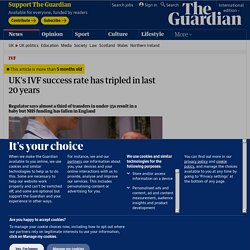
But patients in parts of England are finding it increasingly difficult to access NHS funding for infertility treatment due to what one expert described as a “hugely disappointing” fall in NHS-funded cycles. Though UK guidelines say women under 40 should be given three full IVF cycles, that only happens by default in Scotland, where 60% of treatments were NHS funded in 2018, statistics from the Human Fertilisation and Embryology Authority (HFEA) show.
In England, where funding is decided by local clinical commissioning groups (CCGs), there is a postcode lottery, with just some offering three cycles and others none. The chances of IVF succeeding has improved across all age groups since 1998, though younger women continue to have a far higher birth rate. Woman makes Scottish legal bid to use late husband's sperm. A woman in Scotland is seeking legal approval to have an IVF baby using sperm stored by her late husband who died following a long-term illness.

The court of appeal heard on Tuesday that the woman, known as SB, wished to undergo IVF using sperm taken from seven vials her husband stored in 2011 before he had treatment for cancer. While the couple were not together when the man stored his sperm, they married before he fell ill again and his health deteriorated. He passed away early last year. The case, the first of its kind in Scotland, turns on whether the man gave effective consent for his sperm to be used to create embryos, a procedure performed at IVF clinics. Under the Human Fertilisation and Embryology Act (HFEA), specific consent is needed for the process.
Revealed: Amy Coney Barrett supported group that said life begins at fertilization. Amy Coney Barrett, the Trump administration’s supreme court nominee, publicly supported an organization in 2006 that has said life begins at fertilization.

It has also said that the discarding of unused or frozen embryos created in the in vitro fertilization (IVF) process ought to be criminalized, a view that is considered to be extreme even within the anti-abortion movement. The revelation is likely to lead to new questions about how Barrett’s personal views on abortion may not only shape reproductive rights in the US for decades to come if she is confirmed by the Senate, but how her appointment could affect legal rights for women undergoing fertility treatment, as well as their doctors. In 2006, while Barrett worked as a law professor at Notre Dame, she was one of hundreds of people who signed a full-page newspaper advertisement sponsored by St Joseph County Right to Life, an extreme anti-choice group located in the city of South Bend, which is in the region know as Michiana. India's booming surrogacy business. I am a farmer's daughter and belong to a large family of ten siblings.
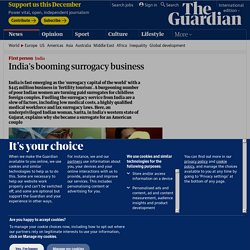
I was conveniently married off by my parents 10 years ago at age 16 to our neighbour's son, despite the fact that he was 15 years my senior. I told my parents that I wasn't keen on marriage and that I would instead like to pursue higher studies and become a teacher. But they would have none of it: "You're ultimately going to become a housewife and not the country's prime minister, so why study so much? " they questioned. My name was struck off the school rolls. My husband Ramesh is employed in a garment factory and gets a paltry 3,000 Indian rupees ($60) per month. To enhance our family income, I've often thought of running a grocery shop. But what actually stoked my material ambitions a few months back was the sudden affluence of a couple of our neighbours. The Nest - Media Centre. Exploitative or altruistic? BBC One's The Nest explores the truth of surrogacy.
The first episode of the new BBC drama The Nest makes for fascinating viewing.
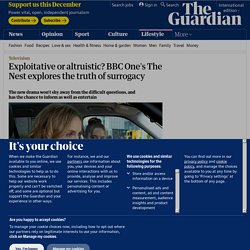
Dan and Emily are having a baby.